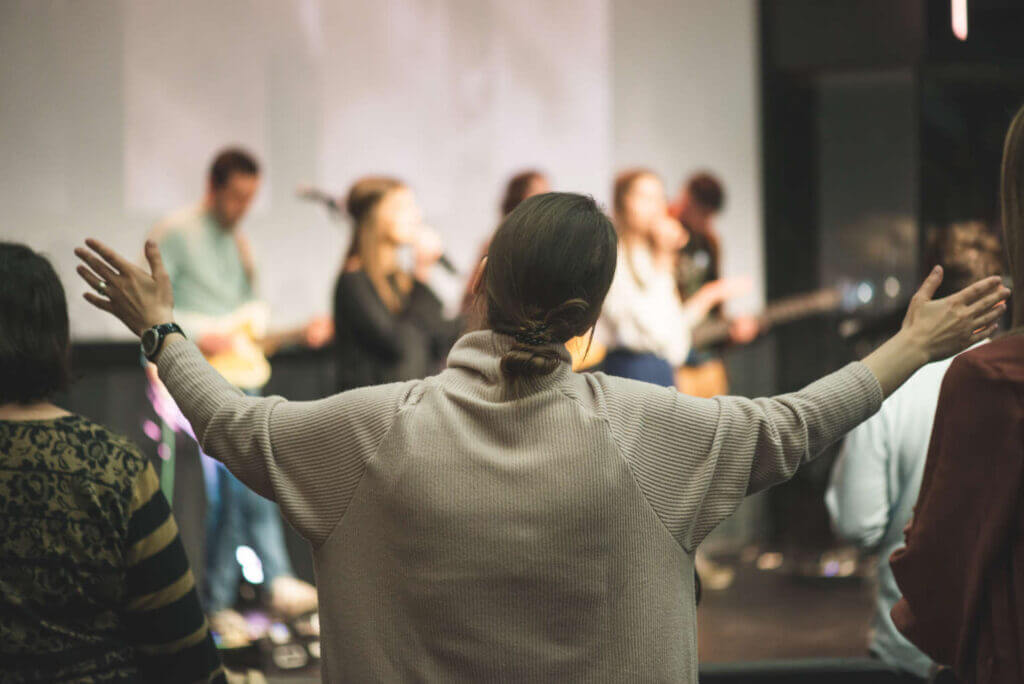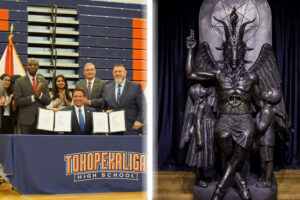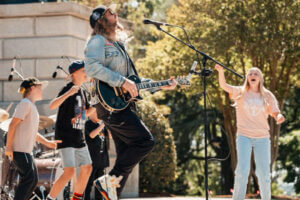The Atlantic reports more and more black women are leaving their Christian backgrounds in favor of the witchcraft-based religions of their ancestors.
More than 200 witches of color gathered in Maryland last month for a convention sponsored by Dawtas of the Moon.
The Atlantic’s Sigal Samuel reports that many of these women sought witchcraft as an escape from Christianity.
“I understand God more now, doing what I’m doing, than I ever did in the Church,” one woman reportedly said from behind a lectern.
Another woman, who says she grew up in the Apostolic church, says she found answers in the demonic when her Christian mother had none.
“I’m asking her questions about Christianity, and I’m like, ‘Why would you do this to us?’ She still can’t give me answers,” Monica Jeffries tells Samuel.
But why now? And where did it come from?
According to “The Witches of Baltimore” piece:
African-American witchcraft originated in West Africa, the birthplace of Yoruba, a set of religious traditions focused on reverence for ancestors and worship of a vast pantheon of deities known as orishas. Those traditions accompanied West Africans who were brought to the Americas as slaves, and were eventually combined with Western religions, such as Catholicism, that many slaves were pushed to embrace.
By the early 19th century, Cuban Santeria, Brazilian Candomble, Haitian Vodou, and other syncretistic faiths had emerged as a result. In cities like New Orleans, voodoo (slightly different from Haitian Vodou) and hoodoo, which also descend from West African faiths, grew popular. These practices—which often involve manipulating candles, incense or water to achieve a desired result—may have helped give slaves some sense of power, however minimal.
But Samuel isn’t the first to take note of the rising trend.
In 2016, Lakshmi Ramgopal interviewed black witch Lakeesha Harris, who founded Black Witch University.
Today, for Harris, being a black witch is about reclaiming ancestral knowledge about witchcraft and using it to fight deep-rooted, systemic oppression. “Audre Lorde says, ‘The master’s tools will never dismantle the master’s house.’ So what will dismantle the master’s house? Your tools. Go and reclaim your tools. Your magic will dismantle the master’s house.” Harris adds that as a black witch, she focuses on how police brutality against Chicago’s black community has impacted what she calls the “vibration” of the city, and how can use her practice to combat that. “It would behoove us to use our own magic for the protection of ourselves and other people.”
With the university, Harris and her fellow black witches have another way to fight the ongoing colonization of African and Afro-American witchcraft by white culture, which frequently appropriates it and fails to credit those who created it. This appropriation is perhaps most obvious in the case of Haitian vodou, which is extremely popular among white witches and in mainstream white culture. “There is this thing about witchcraft being European,” Harris says scornfully, pointing to the white erasure of black witches from modern portrayals of witchcraft. “As if African traditions didn’t have witchcraft!” …
Bostic Seals also describes the hostility she encounters from white people who are surprised to learn a witch can be black. “Racism is rampant. Black Witch University is offering a safe space to people who feel left out or pushed out, who feel like they don’t fit in anywhere or have a place.” In addition, the university will help young black witches navigate relationships with Christian family members who think their interest in the occult will send them to hell. “Those young people are alone,” Bostic Seals says. “Their families are going to tell them that they’re evil, or that [practicing witchcraft is] wrong. If they don’t have a support system of like-minded individuals—that’s going to hurt them. Black Witch University is something that the black witch community really needs.”
“They scold you. Tell you it’s wrong to teach others because you aren’t ordained by their standards. Speak of many characters chosen by God, who lived not so great lives, but assert you can’t be the same. Made you feel insecure for sharing the knowledge because it’s not wrapped in scripture or because they didn’t teach it to you. Deem it incorrect or inadmissible. Ostracized because those church walls no longer connect with you and the truth which festers so deep, your Spirit can no longer contain,” ShaVaughn Elle writes for Medium.
Samuel at The Atlantic elaborates:
Omitola went on to differentiate between African witchcraft and “New Age [expletive],” like the witches who gather to hex President Donald Trump and Supreme Court Justice Brett Kavanaugh. But some of the black witches’ practices—astrology, say—are what the Pew Research Center considers New Age. In fact, a recent Pew study found that the rate of belief in New Age ideas is especially high among the communities that many convention attendees came from: historically black Christian denominations.
The study’s finding that New Age and Christian traditions often coexist in the same person was on full view at the convention. While some witches told me they were finished with Christianity, others said they still attend church, and argued that Christianity and African witchcraft are complementary, not mutually exclusive. As Omitola put it, “The Bible ain’t nothing but a big old spell book.” …
“The church is oppressive for a lot of black women,” said Tamara Young, a 32-year-old government program analyst. “But these African traditions empower women. They’re empowering you to have a hand in what you’re doing—to create your own magic.”
See an error in this article?
To contact us or to submit an article






















